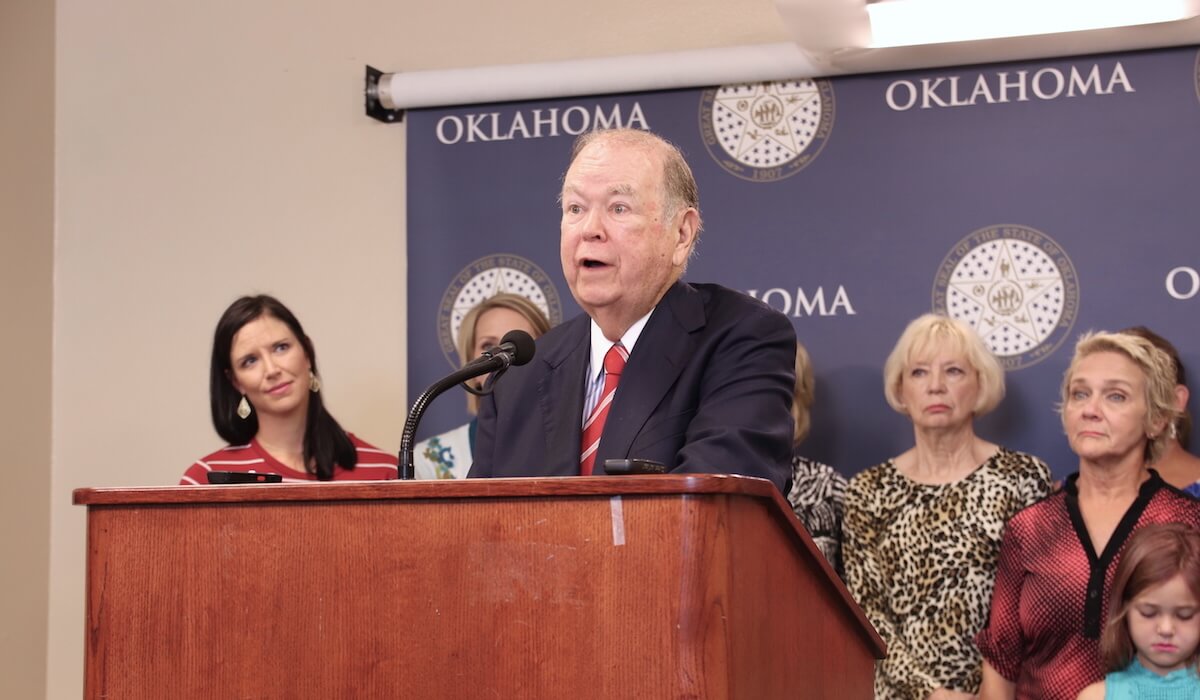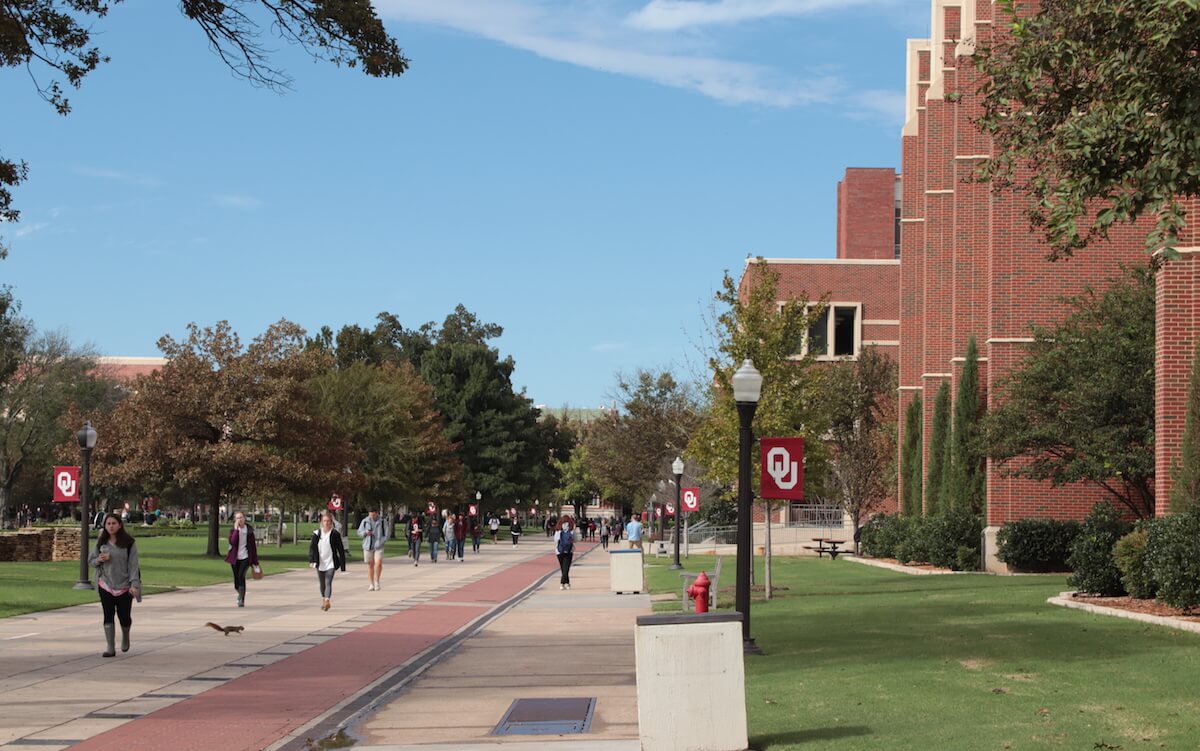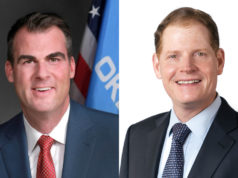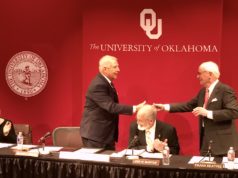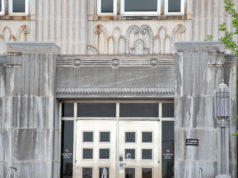
As part of an agreement for longtime University of Oklahoma President David Boren to retire, the OU Board of Regents authorized Boren’s request for what has become more than $800,000 in “retention incentive” payments to six of his top vice presidents. The agreement authorized what could have been more than $1 million in payments, though some did not come to fruition, according to university records.
Then-OU Board of Regents Chairman Clay Bennett helped facilitate the creation of a bonus-based “executive administration program” (EAP) approved June 20, 2017. Two months after the board’s decision, Boren announced he would retire as president June 30, 2018, while retaining an OU office and a teaching role.
In letters to the six vice presidents (embedded below), Bennett said the EAP’s bonuses and pension contributions would be “paid from private funds” and were intended to maintain “institutional continuity.”
But during his first day in office one year later, subsequent OU President Jim Gallogly terminated the employment of one recipient immediately: Vice President of Administration and Finance Nick Hathaway. Gallogly dismissed a second — Vice President of University Development Tripp Hall — four months later. Hall later came under state investigation for a rape allegation made by an OU student, and he has been sued along with OU by a University Club employee for an allegation of sexual battery.
Boren is also the subject of an ongoing Oklahoma State Bureau of Investigation inquiry into allegations of sexual battery and financial misconduct. In June 2019, Boren resigned his OU teaching position, and the university ended all other affiliation with Boren to conclude its Title IX investigation into sexual misconduct allegations.
Two types of payments for OU vice presidents
Under the terms of OU’s “executive administration program,” the firings of Hathaway and Hall each triggered “a one-time lump sum payment” equal to their annual university salaries at the time of removal. But only Hathaway received the payment, with his total payouts from the program equaling $392,170. Hathaway’s separation payment accounted for $301,669 of that amount and was not paid by private funds, according to OU.
At the time of his termination, Hall’s base salary was $226,080, but his attorney and OU said Hall did not receive the termination lump sum previously approved by regents.
The pair received other retention payments before being let go.
Two days before Hathaway was removed from his position in 2018, he, Hall, Vice President of Student Affairs Clark Stroud and OU Health Sciences Center Vice President of Administration and Finance Kenneth Rowe each received a “supplemental payment” totaling 15 percent of their respective salaries to “further incentivize your retention,” Bennett wrote in his letters.
Those four vice presidents had also received incentive payments of 15 percent of their base salaries in 2017. Unlike Hathaway and Hall, Stroud and Rowe remain with the university, but only Rowe received a final 15 percent payment June 30, 2019, according to OU. Rowe replaced Hathaway at OU’s Norman campus and retained his $301,200 base salary.
Stroud, on the other hand, left his $219,150-salaried VP position and became OU’s director of football operations at a base salary of $155,000. Under the terms of Stroud’s retention agreement, his transition could have triggered another provision: a $64,150 lump-sum payment of the difference between his two salaries. According to OU, that did not happen because he was “not eligible.”
The two final vice presidents to be granted 2017 “retention” agreements were Vice President and General Counsel Anil Gollahalli and Vice President of University Governance Chris Purcell, both of whom remain in their same positions today.
Gollahalli works as the attorney for both OU’s president and the OU Board of Regents, a complicated arrangement owing to the board’s oversight responsibilities for the university president. He has served as general counsel to three presidents: Boren, Gallogly and current interim President Joe Harroz, who preceded Gollahalli as Boren’s general counsel. Gollahalli’s retention arrangement differed from the other vice presidents, instead featuring annual pension deposits equal to 15 percent of his salary in perpetuity of his employment.
Purcell received a retention pension package in the same structure as Gollahalli’s. She also serves as the OU Board of Regents’ executive secretary.
So far over three years, Gollahalli has received $94,575 in pension deposits and Purcell has received $75,578, according to numbers provided by OU. The letters sent to them in 2017 indicated their annual 15 percent pension contributions would continue for as long as they are employed by the university.
Legislator: ‘From what I know, I’m troubled’
In all, the “retention incentive” payments totaled $846,252 over the past three years and would grow as long as Gollahalli and Purcell continue to receive pension deposits. The total is only a portion of the widespread “supplemental pay” bonuses Boren is believed to have distributed during his 24-year presidential tenure.
Exactly one year after the regents authorized the EAP payments as part of Boren’s retirement agreement, incoming President Jim Gallogly shocked the public at a regents meeting when he criticized OU’s budgetary structure for “inefficiencies” and “overspending.”
“I consider myself a financial expert, and it’s taken me days and weeks and months to sort it all,” Gallogly said. “But I do feel that we have a very good grasp of where we’re at today, and frankly, I’m not pleased with what I found.”
Nearly two years later, others are displeased to learn about the “retention incentive” payments negotiated for Boren’s departure.
“From what I know, I’m troubled,” said Rep. Mark McBride (R-Moore). “I need to know more, because this doesn’t look good in the public’s eyes.”
First elected in 2012, McBride became chairman of the House Appropriations and Budget Education Subcommittee last year when state higher education funding rose by $28 million. That partial restoration of past cuts — some of which came as pre-emptive response to Boren’s failed $0.01 sales tax ballot measure — was made possible by the historic revenue-raising agreement McBride struck with House Democrats. Lawmakers also felt confident that Gallogly was addressing OU’s fiscal issues, which he said included $1 billion in bonded debt and a $25 million budgeted deficit.
But concerned by lawsuits facing OU and the revelation that donor data had been misreported by the university, McBride decided to attend the September meeting of the OU Board of Regents. Along with his subcommittee’s Vice Chairwoman Toni Hasenbeck (R-Elgin), he returned for the October meeting and sat in on the board’s October executive session.
“I’m looking for universities to be transparent in everything,” McBride said when asked about OU’s executive administration program.
Like McBride, other longtime legislators had not heard of the 2017 retention incentive program created during Boren’s exit.
“I would like to know more information about this, as it raises a lot of questions,” said House Minority Leader Emily Virgin (D-Norman). “There needs to be some scrutiny of how university money was used in this situation, no matter whether it involved public or private dollars.”
Brewster: Boren ‘a caring, appreciative leader’
While state lawmakers did not know about OU’s “retention incentive” payments, Boren attorney Clark Brewster spoke with familiarity of the situation Wednesday.
“It’s the kind of thing, honestly, that David Boren does from the standpoint of making sure others aren’t impacted negatively or terminated abruptly. He cared about all of them and their families,” Brewster said. “There’s no sinister element to it. It’s just the kind of thing that a caring, appreciative leader would do.”
RELATED
David Boren, Tripp Hall remain under OSBI investigation by Tres Savage
Brewster said he wishes the “whisper campaign and rumors” about Boren would end. He said the public should view Boren’s proposal of the EAP payments as evidence the former governor and U.S. senator is “generous and protective.”
“David was concerned that these people had dedicated a good deal of their careers to OU, and he was concerned that without him being involved administratively going forward that somebody might come in and terminate these people abruptly, and they didn’t have any protection,” Brewster said. “So he went to the regents and said, ‘Hey, listen, can we come with a plan to create at least some reliability and comfort for these guys so that they are not going to be terminated abruptly if a new person comes in.'”
Brewster said he does not believe OSBI has asked Boren about the retention incentives, and he said he thought only “maybe one person” actually accepted the bonuses. Brewster said he thought his other client, Tripp Hall, did not accept the payments.
But documents provided by OU indicate Hall received a combined $67,824 from his 2017 and 2018 supplemental retention payments.
Brewster did not say why Hall did not receive the termination lump sum outlined in his letter from Bennett, but the attorney did say creation of a retention program during an executive’s transition period is “pretty common” in the private sector.
“I can think of 10 different companies that I’ve been involved with over the years (that did this),” Brewster said. “There are universities that have done it, too. I don’t think you’ll find this to be particularly odd.”
He said the amount of fundraising done by Hall was notable.
“Tripp Hall raised $2 billion during his time. These guys performed at an incredibly high level,” Brewster said. “The university was doing very, very well, and I don’t know how that’s to be criticized.”
RELATED
As OU’s leadership changed, Jabar Shumate caught in cultural crosshairs by Tres Savage
Gallogly has disagreed, publicly stating that alumni-giving data had been misreported to U.S. News & World Report since 1999. Concerns have also been raised about how in-kind gifts were reported by the Office of University Development, headed by Hall. (In his May 2019 retirement letter, Gallogly specified that the gift reporting issues were not related to the OU Foundation.)
Asked about the circumstances of Hall’s Nov. 1, 2018, firing by Gallogly, Brewster called the situation “strange.”
“He had coffee with him a couple of days earlier. Everything was fine, he was assured everything was great,” Brewster said. “There were no issues, and then two days later he was called over and said, ‘We’re going to let you go.’ It was kind of a strange circumstance.”
Brewster said the retention payments were even more important for the six vice presidents because of “how little they were making.”
Each of the six OU vice presidents was making more than $219,000, with three of them earning more than $300,000.
“That would be small potatoes if you were in the private world doing the work they were doing,” Brewster said. “But that’s just my view.”
Reached by phone, Hathaway declined to comment on his retention payments or termination. Both Hathaway and Hall had worked at OU since Boren assumed the presidency in 1994.
Prominent Oklahomans on board at time of deal
The OU Board of Regents approved its retention incentives for the six vice presidents during the final meeting of their June 2017 annual retreat in Oklahoma City. According to multiple people with direct knowledge of the situation, regents were mostly unified in their desire for Boren to retire, even if it meant paying bonuses he requested for close confidants who had devoted their careers to OU.
In considering the EAP’s creation, regents wedged the item among personnel actions and voted on the hundreds of employment changes as a package, which was approved by six of the board’s seven regents:
- Clay Bennett (resigned January 2019 amid health issues one year after being reappointed to the board)
- Leslie Rainbolt-Forbes (14 years on the board will end March 21)
- Phil Albert (appointed in 2016 by Gov. Mary Fallin)
- Bill Burgess (deceased February 2019)
- Renzi Stone (resigned October 2019 after chairman-elect vote)
- Kirk Humphreys (resigned December 2017 after making controversial remarks on television)
Despite having voted in favor of previous agenda items, meeting minutes show regent and former Gov. Frank Keating did not vote on the personnel actions. Asked about not voting on the package that included the retention incentives, Keating said he did not remember specifics of the discussion.
“I do recall that there were a number of unresolved loose ends that needed to be addressed before I could support the measure,” said Keating, a former FBI agent. “Whether those issues were addressed, I don’t know. I wish I could be more helpful.”
As outlined in Article 13, Section 8 of the State Constitution, governance of the University of Oklahoma is “vested” in its Board of Regents.
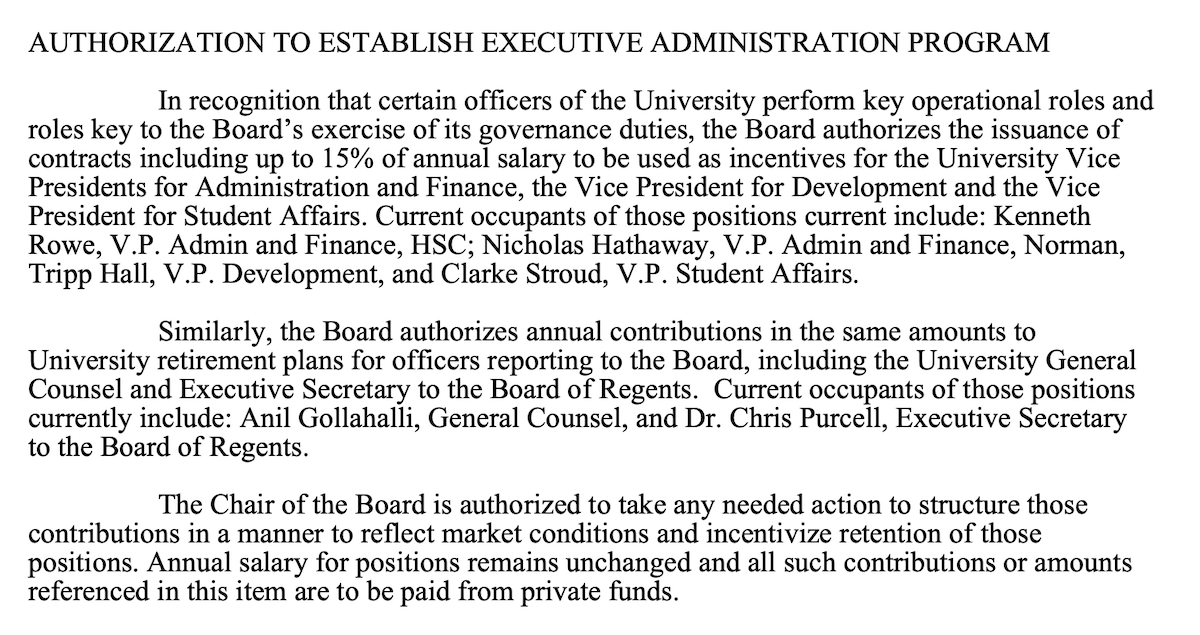
Hathaway severance paid from public funds
According to Bennett’s June 2017 letters obtained by NonDoc via public records request, the six OU vice presidents’ bonuses would be paid with “private funds.” Asked to clarify whether the source of those funds were existing donations, new donations or other OU Foundation revenues, the university said the moneys were simply “unrestricted” donations.
“The university was reimbursed by private unrestricted OU Foundation funds, except for the separation payment made to Nick Hathaway in FY2019,” said Kesha Keith, OU director of media relations.
Rainbolt-Forbes, who will chair her final OU regents meetings March 10 and 11, said in a statement that the retention incentive payments created in 2017 were “carefully considered.”
“We knew at the time a presidential transition was on the horizon,” Rainbolt-Forbes said. “The regents carefully considered the program to keep momentum and sustain ongoing operations and initiatives. Retention was essential to make sure we provided continuity during the transition to ensure everything went as smoothly as possible.”
Bennett did not return a voicemail left at his office seeking comment.
Letters from Clay Bennett to six vice presidents
https://nondoc.com/wp-content/uploads/2020/03/Letters-ExecutiveAdministrationProgram_Redacted.pdf” height=”450px” download=”all”](Correction: This story updated at 11:30 a.m. Friday, March 6, to correct reference to the misreporting of donor data by the University of Oklahoma’s Office of University Development. NonDoc regrets the error. The story was previously updated at 1:45 p.m. Thursday, March 5, to add more information regarding why Stroud did not receive an additional payment.)









